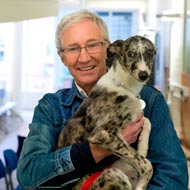
Awareness week aims to reduce attacks on postmen
TV presenter Paul O'Grady is backing a Royal Mail campaign to reduce the number of dog attacks on postmen and women in the UK.
Now in its second year, Dog Awareness Week highlights the issue of dog attacks and aims to encourage responsible ownership.
According to the latest figures, the number of attacks on postmen and women fell by 10 per cent in 2014/15, following changes in dangerous dog legislation and increased dog awareness campaigns.
Nonetheless, there were 2,960 attacks between April 2014 and April 2015. This equates to around eight postmen and women a day. Royal Mail says it is committed to driving the figure down further.
Paul O'Grady, much-loved presenter of the hit ITV show For the Love of Dogs, said: “Your dog may be your best friend but that doesn’t necessarily mean he’s everyone’s best friend.
"Our four-legged friends can get anxious around new people and need our help and reassurance… So many dog bites could be avoided if we all took more time to train and socialise our dogs and get them used to meeting new people.”
This year's Dog Awareness Week is running from 29 June - 4 July. It is supported by the Communications Workers Union, National Police Chief's Council and a number of animal welfare charities including Dogs Trust and Battersea.
Shaun Davis, Royal Mail's director of safety, health, wellbeing and sustainability, said: “We know that most dogs are not inherently dangerous, however, even the most placid animal can be prone to attack if it feels its territory is being threatened.
"Our first priority as an employer is to ensure the welfare and safety of our people who provide a valuable service to our customers. We appeal to owners to keep their pets under control."
Image courtesy of Battersea Dogs and Cats Home



 The Animal and Plant Health Agency (APHA) has updated its online reporting service for dead wild birds.
The Animal and Plant Health Agency (APHA) has updated its online reporting service for dead wild birds.